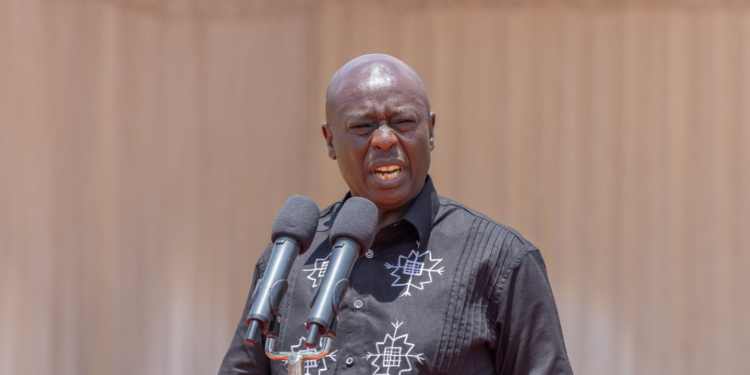Deputy President Rigathi Gachagua has alleged a series of covert meetings aimed at orchestrating his impeachment, adding fuel to the country’s ongoing political turbulence. In an interview with Citizen TV, Gachagua said these gatherings, held in secret by political opponents, are part of efforts to remove him from office, even as the country grapples with urgent economic and social challenges.
“There are schemes going on every day,” Gachagua said during the interview at his Karen residence. “People are being called, being offered money to impeach the Deputy President. These things are in the public domain, and I was informed of a meeting in Nyahururu where this was discussed.”
The deputy president did not provide concrete evidence but claimed the plotting involves bribery and coercion, with some politicians being intimidated into participating. “We know what was discussed, and we know the amount of money that exchanged hands,” Gachagua remarked, adding that he would soon address his supporters to explain what he sees as attempts to disrupt his leadership.
Gachagua’s statements come at a critical juncture for Kenya, where the ruling administration faces a daunting list of national challenges, including a growing debt burden, delayed infrastructure projects, and widespread public dissatisfaction. However, the deputy president’s remarks focused less on these issues and more on internal political dynamics.
Gachagua stressed that such plots to remove him would need the approval of President William Ruto, stating that any impeachment motion brought to the National Assembly would only advance with the president’s endorsement. “In our government, any serious motion goes through a parliamentary group meeting with the president,” he said. “If this motion reaches the floor, it will be because the president gave it a nod.”
While Gachagua played down the personal significance of the alleged impeachment attempts, noting that he could “easily go home” if removed from office, he emphasized the potential destabilizing impact such efforts could have on the nation. “This is not about me—it is about the country’s political stability. We are just two years into our term, and already people are talking about impeachment instead of delivering on our promises.”
Leadership in Nairobi
The deputy president also addressed the growing dissatisfaction among traders in Nairobi’s key markets, which he attributed to perceived neglect by the county government. Gachagua recently toured Wakulima, Muthurwa, and Gikomba markets, where he met traders frustrated by issues such as poor sanitation, lack of water, and forced evictions.
As the deputy president explained, his involvement was driven by a sense of responsibility, having personally campaigned for Nairobi Governor Johnson Sakaja in the run-up to the 2022 elections. “I guaranteed these traders that under our administration, their businesses would flourish. But now they feel let down, and they are coming to me because I vouched for Governor Sakaja,” Gachagua said.
He reiterated that his intervention is not an attempt to usurp the county government’s authority but rather to elevate the traders’ grievances. “Advocacy is part of governance. The fact that I have raised these issues means they are now being addressed,” he said, adding that the traders’ concerns would be given the necessary attention.
Gachagua’s public support for the traders has drawn accusations of tribalism, particularly due to his use of his mother tongue, Kikuyu, when speaking at market rallies. He defended his actions, saying, “I speak the language people understand best. These are the same people I spoke to during the campaign, so why should it be a problem now?”
Relationship with President Ruto
The deputy president dismissed rumors of a rift between him and President Ruto, though he acknowledged that the president has yet to take firm action to quell rising political tensions within the ruling coalition. “I have spoken to the president several times and asked him to call the house to order. There are many challenges facing this country, and we cannot continue with this toxic environment,” Gachagua said.
He also alluded to a growing disconnect in his communication with the president’s office, noting that he had recently been removed from the presidential diary, making it difficult to align his schedule with that of the head of state. However, Gachagua downplayed the significance of these developments, saying he remained focused on fulfilling his mandate.
Looking Ahead
Despite the political intrigue surrounding him, Gachagua emphasized his commitment to serving the Kenyan people. He warned that continued political wrangling within the government could delay key national projects and harm the country’s fragile economy. “Kenyans are tired of politics. They want results,” he said, urging leaders to shift their focus back to delivering on campaign promises.


















